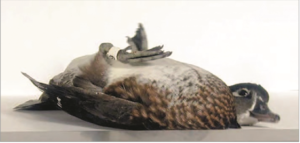The Vermont Fish and Wildlife Department is reminding the public to take precautions around wild birds, as virulent avian influenza (HPAI) continues to circulate in the state.
Backyard flocks of domestic birds in Caledonia and Lamoille Counties have had to be destroyed after exposure to the virus, commonly known as avian flu.

“Highly pathogenic avian influenza has been detected in more than 70 wild birds since March, with cases reported most months and in every region of the state,” said Wildlife Program Manager David Sausville. “Many exposures come from migrating birds, so we expect case numbers to drop as winter temperatures set in. However, Vermonters still need to be mindful that this disease is present in our birds.”
HPAI poses a low risk to human health. However, the virus causes severe illness and high mortality in poultry. Transmission from wild birds is a primary cause of infection in domestic flocks, and human exposure can contribute to spread of the virus.
“Avoiding contact with any birds that seem sick, and not handling wild birds in general, are the most important steps the public can take to prevent the spread of HPAI,” said Sausville.
Sausville also asked Vermonters to report sightings of multiple dead birds in the same area to wildlife officials. Reports can be made by email to [email protected], or by calling 802-828-1000.
People can find information to help distinguish between natural expected bird mortality versus something that may be more serious by visiting the Fish and Wildlife Department’s HPAI web page. Sick birds should not be taken into homes or rehabilitation facilities, and bird feeders should be washed frequently and placed far away from areas that might bring wild birds into contact with domestic fowl.
Up-to-date guidance for minimizing the spread of HPAI from wild birds can be found in the department’s online HPAI bulletin via vtfishandwildlife.com.




